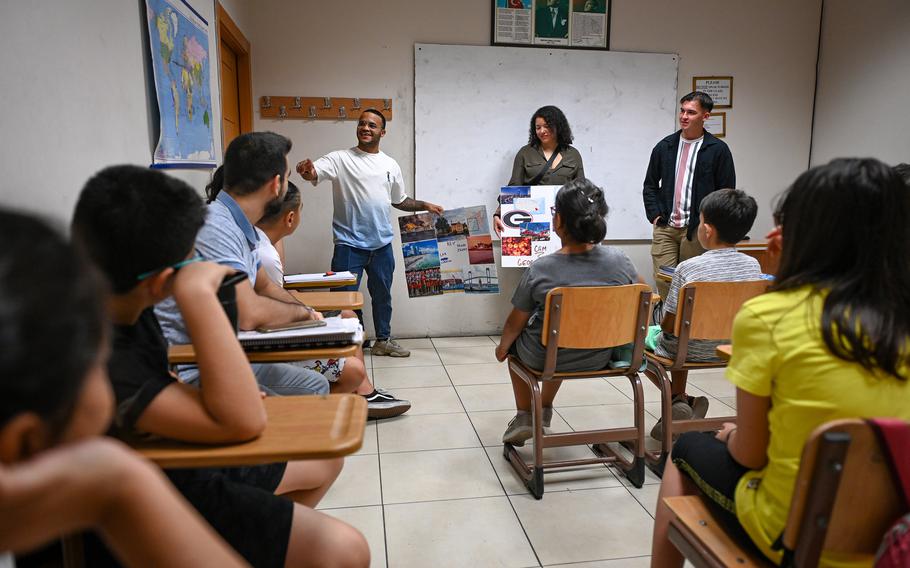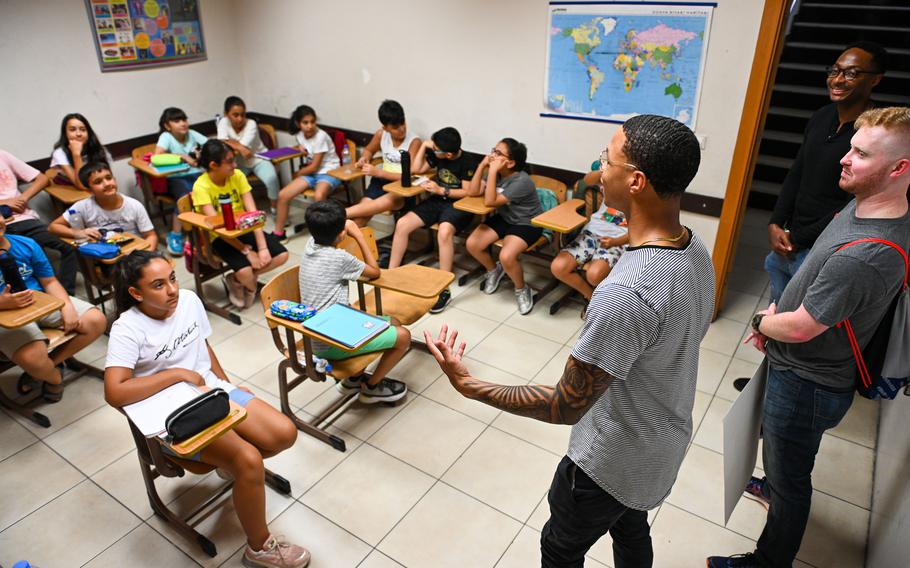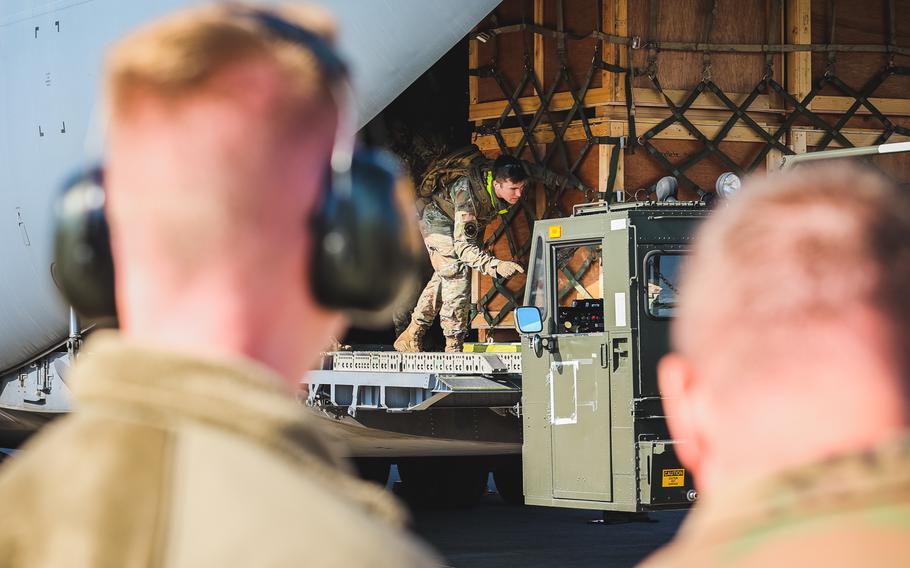
Airmen from the 39th Air Base Wing at Incirlik Air Base in Turkey give a presentation on American culture Aug. 23, 2022, to English language learners in Adana, Turkey. Airmen began visiting students in February 2022 to enhance cultural ties between the base and the surrounding community. The program is slated to resume in June after a pause prompted by devastating earthquakes in February. (Joshua Crossman/U.S. Air Force)
A nascent outreach program that brings U.S. airmen stationed at Incirlik Air Base into English language classes in the nearby Turkish city of Adana is looking to come to life again three months after earthquakes devastated the region.
When the main temblor struck Feb. 6, a partnership aimed at bridging the cultural gap between Turks and Americans after years of isolation had just marked its first anniversary.
Tens of thousands of people in Turkey and neighboring Syria were killed during the initial 7.8 magnitude quake and a series of powerful aftershocks, spurring an enormous international relief effort in which Incirlik personnel contributed mightily.
The exchange pairs the Airman Leadership School of the 39th Air Base Wing with the Turkish-American Association’s language school in Adana.
Airmen go off base to meet with students ages 10 to 60 about every eight weeks, giving presentations and answering questions on topics ranging from American pop culture to overall life experiences, said Tech. Sgt. Francisco Jimenez, an Airman Leadership School instructor.
The program gives Turkish participants the chance to meet and speak to Americans firsthand, said host nation adviser Mehmet Birbiri, the liaison and guide for the cultural exchange.

Airmen stationed at Incirlik Air Base in Turkey speak with Turkish-American Association students in Adana, Turkey, on Aug. 23, 2022. The airmen began visiting the association last year to help students with their English lessons and enhance cultural ties. After a pause in visits following the February earthquakes that struck Turkey and Syria, they are planning to renew the partnership in June. (Joshua Crossman/U.S. Air Force)
The sessions are held in the building of the Turkish-American Association, a nonprofit organization in Adana.
Exchanges through the program help strengthen community ties and broaden airmen’s understanding of their Turkish neighbors, said Capt. Gerald Peden, a spokesman for the 39th Air Base Wing.
Until recently, such interactions outside Incirlik’s gate were rare. That’s one reason why both sides are looking to rekindle the program, U.S. officials said last week.
Airmen are planning to restart their visits to the students in June, Jimenez said.
U.S. troops were forbidden from leaving the base beginning in 2016, when deteriorating security in the area led the Pentagon to order nearly 700 family members of military personnel to leave Incirlik and two smaller military installations in Turkey.
Unaccompanied tours of one year became the norm.
“That was a shame for all of us really,” Birbiri said, “that the Americans come here to Incirlik and they are stuck on base, without mingling or exchanging any culture with the locals.”
That began to change last year, after the U.S. Consulate in Adana pitched the idea of a culture and language exchange program with Incirlik airmen to the Turkish-American Association, said Erica Marrero, a public affairs officer at the consulate.
The nonprofit organization offers English language courses after school hours, in the evening and on weekends. It “was looking for English speakers to practice conversation with their students, and this was a natural fit,” Marrero said.
The program also served the consulate’s public outreach mission in Adana and southeastern Turkey. With only a handful of foreign service officers, the consulate relies on the diversity of experience and backgrounds that Incirlik airmen bring to outreach initiatives, Marrero said.
When airmen first started visiting the school in February 2022, they were among the few interacting with locals off base at the time.
Travel restrictions for airmen began easing last year, with some trips to nearby sites and cities authorized. But the wing began letting airmen visit the nearby community outside the gates only a few weeks before the first earthquake hit.
They were limited to a 10-block area southeast of the base known as American Alley. That access was again temporarily restricted after the earthquakes and has since reopened, Peden said.

U.S. Air Force members offload tents to aid earthquake victims Feb. 22, 2023, at Incirlik Air Base, Turkey. Three months after devasting earthquakes that killed more than 50,000 people in southern Turkey and northern Syria, airmen at Incirlik are looking to resume a nascent outreach program with the Turkish-American Association’s language school in Adana. (James Bourgeois/U.S. Air Force)
But airmen can now travel to certain locations beyond the 10 blocks and throughout Turkey at their leisure or through tours organized by the base recreation center, which have resumed, he said.
Some areas are still off-limits because of safety concerns and a desire to show respect to Turks recovering from the earthquakes, according to Peden.
Meanwhile, the wing’s round-the-clock relief efforts have scaled down considerably, Peden said. In early March, a 100-bed field hospital in Hatay province was turned over to Turkish authorities.
The 39th Civil Engineer Squadron had helped set up the tent city to offset the loss of 1,500 hospital beds as a result of the quakes.
The Turkish-American Association suspended classes for a little more than a month after the earthquakes out of concern for students and teachers, Marrero said, adding that the building reopened once it was deemed safe.
Jimenez said the partnership helps airmen practice their communication skills. They make a poster about their home state and use it in a group presentation.
They also pair up with a student and together select topics about American culture that will spark a conversation, Jimenez said.
Birbiri has noticed that students tend to be shy when first meeting the Americans.
They warm up quickly, though, and by the end, “both sides are shaking hands, hugging each other. It’s really a great, successful program,” he said.